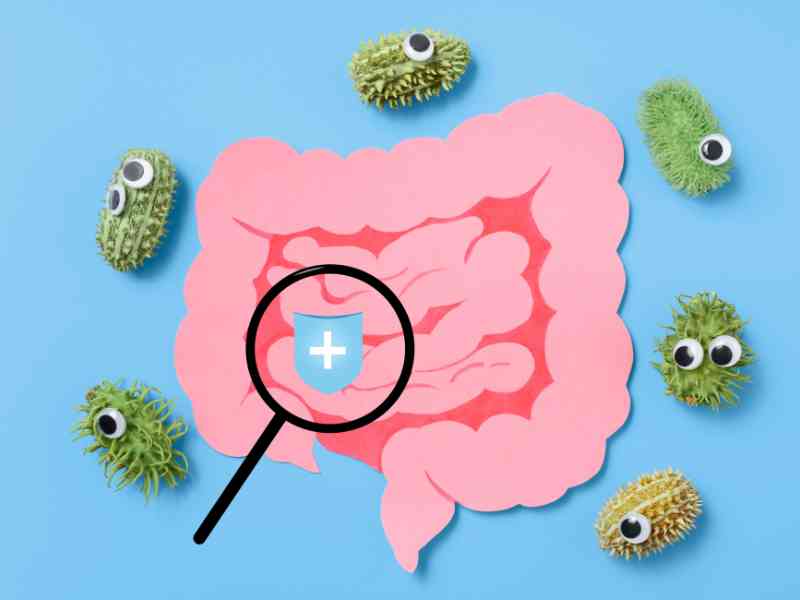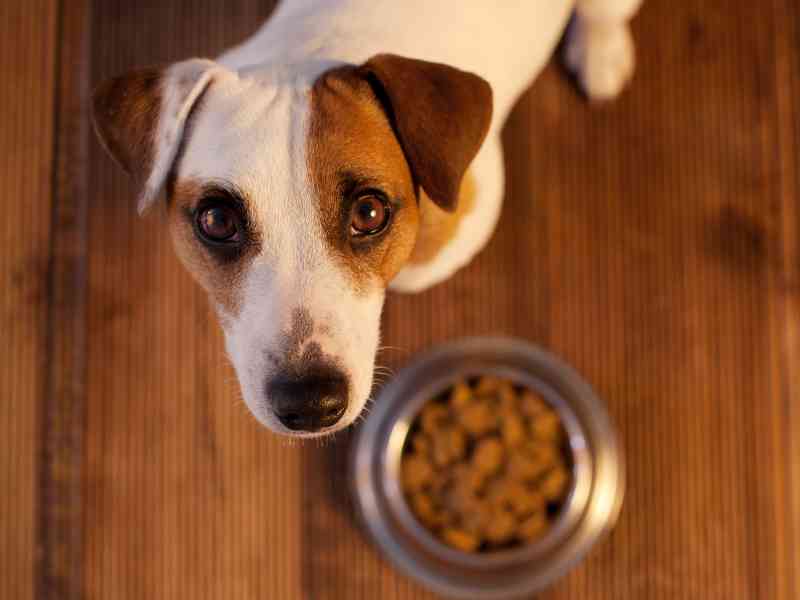They may not be the trendiest topic at the dog park, but prebiotics and prebiotic fibers for dogs are essential for your dog’s health. Think of these fibers as the behind-the-scenes workers in your dog’s gut. They’re not glamorous, but they do a crucial job: they’re the first part of keeping your dog’s digestive system in top shape. Why should you care? Because what happens in your dog’s gut doesn’t just stay there – it affects their overall health and happiness. There’s often a lot of talk about probiotics for dogs, but not as much for prebiotics for dogs–we want you to know the difference!
What Are Prebiotics for Dogs And How Do They Affect Digestive Health?
Prebiotics for dogs may sound like a fancy buzzword to make dog food labels look smarter. It happens a lot, the newest ‘thing’ on the block is what gets marketed for dog parents.
But when it comes to prebiotics for dogs, it’s real. They’re actually a type of dietary fiber – but not the kind that just helps with making sure your dog’s poop is perfect (though that’s a great outcome!). These fibers are food for the good bacteria, the probiotics, in your dog’s gut. Think of them as a gourmet buffet exclusively for the beneficial microbes living in your dog’s digestive system.
But they’re not just what comes before probiotics and feeds them. They’re selective, meaning they feed the good bacteria and give the cold shoulder to the not-so-good ones. This selective feeding is not just super smart, but helps maintain a balance in your dog’s gut, promoting better digestion, stronger immunity, and overall, a happier, healthier dog. Giving prebiotic fibers for dogs is like giving your dog a secret weapon against tummy troubles and more, hidden right there in their food bowl.
Prebiotic vs Probiotic for Dogs
So what’s the difference between prebiotics and probiotics for dogs? We know, it can get kind of confusing and many think they’re basically the same. There IS a difference, though!
Probiotics are live bacteria – the good guys that you want hanging out in your dog’s digestive tract. They’re like tiny warriors fighting off the bad bacteria and keeping the peace in the gut neighborhood. They’re smart too, and they know how to tell the difference between what is good for your dog’s microbiome and what’s not.
Prebiotics, on the other hand, are what these tiny warriors eat. No warriors can fight on an empty stomach, right? Prebiotics don’t actually contain or are bacteria themselves; they’re the fuel that helps the good bacteria thrive and multiply. Without prebiotics, probiotics are like superheroes without their powers – still good, but not quite as effective.
So, when it comes to your dog’s gut health, prebiotics and probiotics are a dynamic duo. They work together like a well-trained dog and its owner – each playing a vital role, and together, they’re unstoppable. Adding both to your dog’s diet can help create a gut environment that’s about as healthy as it gets. And a healthy gut means a happy dog, which, in turn, means a happy you.
Popular Prebiotics For Dogs: Unpacking Inulin and XOS
Dogs, like us, need a balanced diet to thrive, and this includes fibrous compounds that support their gut flora. Enter Inulin and Xylooligosaccharides (XOS)—two of the most popular prebiotics that can supercharge your dog’s digestive health.
Inulin: A Fantastic Fiber Frontrunner
Inulin is a naturally occurring soluble fiber found in plants. Science shows us that it’s not just a gut health promoter; it’s a multifaceted wellness enhancer for dogs. It encourages the growth of beneficial bacteria, improves digestion, and helps manage fat absorption, especially in dogs with sensitive stomachs. Insulin’s impact goes so far as to help control inflammatory bowel disease and even act as an antioxidant. Beyond its digestive benefits, it has the potential to regulate blood sugar and assist in weight management, making it a valuable addition to your best buddy’s diet.
XOS: The Super Prebiotic
Then there’s xylooligosaccharides (XOS), superstars in the prebiotic world. XOS are selective feeders for beneficial gut bacteria like bifidobacteria and lactobacilli, which are found predominantly in dog guts. It’s been shown to improve gut health in puppies and adult dogs by altering the gut microbiota in their favor. XOS not only supports the local immune system in the gut but also has a systemic anti-inflammatory effect that helps keep your dog’s overall health in check. And, as if that wasn’t enough, it’s also a fighter of oxidative stress. This means it helps battle cellular damage throughout your dog’s body. In the dog nutrition world (and humans too!), XOS stands out as a ‘super-prebiotic’.
An Important Role of Prebiotics in A Canine Healthy Digestive System: Short-Chain Fatty Acids Creation
In the world of dog health, prebiotics such as Inulin and Xylooligosaccharides (XOS) are more than just diet additions; as science shows, they help your best friend thrive. These prebiotics are the unsung heroes behind producing short-chain fatty acids (SCFAs), which play a vital role in maintaining gut health.
When Inulin and XOS reach your dog’s large intestine, they become the feast of choice for the beneficial bacteria. As all that flora chow down on prebiotics, they ferment them, which produces SCFAs as a by-product. Prebiotics are important so SCFAs like acetate, propionate, and butyrate can become energy sources for intestinal cells, signaling molecules, and modulators of inflammation. They are NOT just waste, and they have prebiotics to thank for being so helpful!
Short-Chain Fatty Acids: Multitaskers Of The Dog Gut
The SCFAs produced by the fermentation of prebiotics have several key roles:
- Energy Providers: Butyrate, in particular, is a preferred energy source for colonocytes, the cells lining the colon, supporting their health and integrity.
- Inflammation Regulators: These fatty acids have a hand in controlling local inflammation in the gut, which can prevent and alleviate conditions like inflammatory bowel disease.
- pH Balancers: By lowering the intestine’s pH, SCFAs inhibit pathogenic bacteria’s growth, promoting a stable and healthy microbial community.
- Immune Modulators: SCFAs are known to influence the immune system, helping to protect it against pathogens while also regulating the overreaction to harmless substances.
- Gut Motility Influencers: They play a role in gut motility, which can affect how quickly food moves through the gut, influencing bowel regularity.
- Digestion Improvers: Enhanced digestion allows dogs to better optimally absorb nutrients from their food, supporting overall health and energy levels.
- Gut Barrier Strengtheners: A strong intestinal lining is critical for preventing the leakage of harmful substances into the bloodstream and complications like Leaky Gut.
- Immune Defenders: A well-functioning immune system helps dogs be resilient against infections and may help improve their vaccine responses.
Prebiotics like Inulin and XOS aren’t just boring ingredients in your dog’s diet; they play such an important role in shaping your dog’s gut microbiome through the production of SCFAs. These fatty acids greatly affect your dog’s gut health, supporting everything from nutrient absorption to immune function. Including prebiotics in your dog’s diet is like strategically planning their long-term health and well-being. Do Dog Foods Have Prebiotics For Dogs?
Do Dog Foods Have Prebiotics For Dogs?
When you scan the ingredient list on a bag of dog food, you might see terms like Inulin, FOS (fructooligosaccharides), or even XOS (xylooligosaccharides). It’s true; many dog food manufacturers have jumped on the digestive health bandwagon and included prebiotics in their formulations. It’s a step in the right direction, but here’s the kicker: the presence of prebiotics alone doesn’t guarantee optimal gut health for your dog.
The Challenge of Nutrient Absorption For Dogs
Think of it this way: simply sprinkling prebiotics into dog food is a bit like planting seeds in unprepared soil. They might grow, but without the right conditions—nutrient-rich soil, adequate water, and sunlight—they won’t reach their full potential. Similarly, for dog food’s prebiotics to be effective, they need a wholly healthy gut environment to flourish. That’s one of the reasons we created Bernie’s Perfect Poop.
The Importance of Beneficial Bacteria In A Healthy Gut Ecosystem
A healthy gut is like a bustling little city, with each microbe doing a particular and important job. If this balance is off, your dog might not fully benefit from the prebiotics in the food you give them. They need a thriving population of beneficial bacteria to ferment these prebiotics and produce those precious SCFAs for all the reasons we’ve discussed—nutrient absorption, immune function, and more.
The Role of Quality Supplements For Dog Gut Health
We created Bernie’s Perfect Poop to give our own dogs a holistic approach to digestive wellness. We knew we needed the best ingredients, and especially the best prebiotics, for dogs to encourage probiotic flourishing. We wanted to create in our dogs a healthy, balanced gut that had digestion-regulating fibers and digestive enzymes complemented by prebiotics that ensured that the gut was fed well. We wanted to support their gut flora, ensure the integrity of their gut lining, and facilitate the overall digestive process. Choosing the ingredients we did was based on science so that we could confidently promote a healthy gut ecosystem, and it really started with us wanting to make sure that prebiotics played their important part!
Giving your dog Perfect Poop with each meal can do the same for your best friend!


